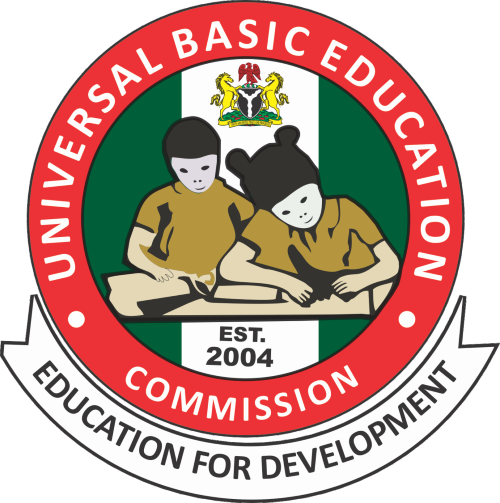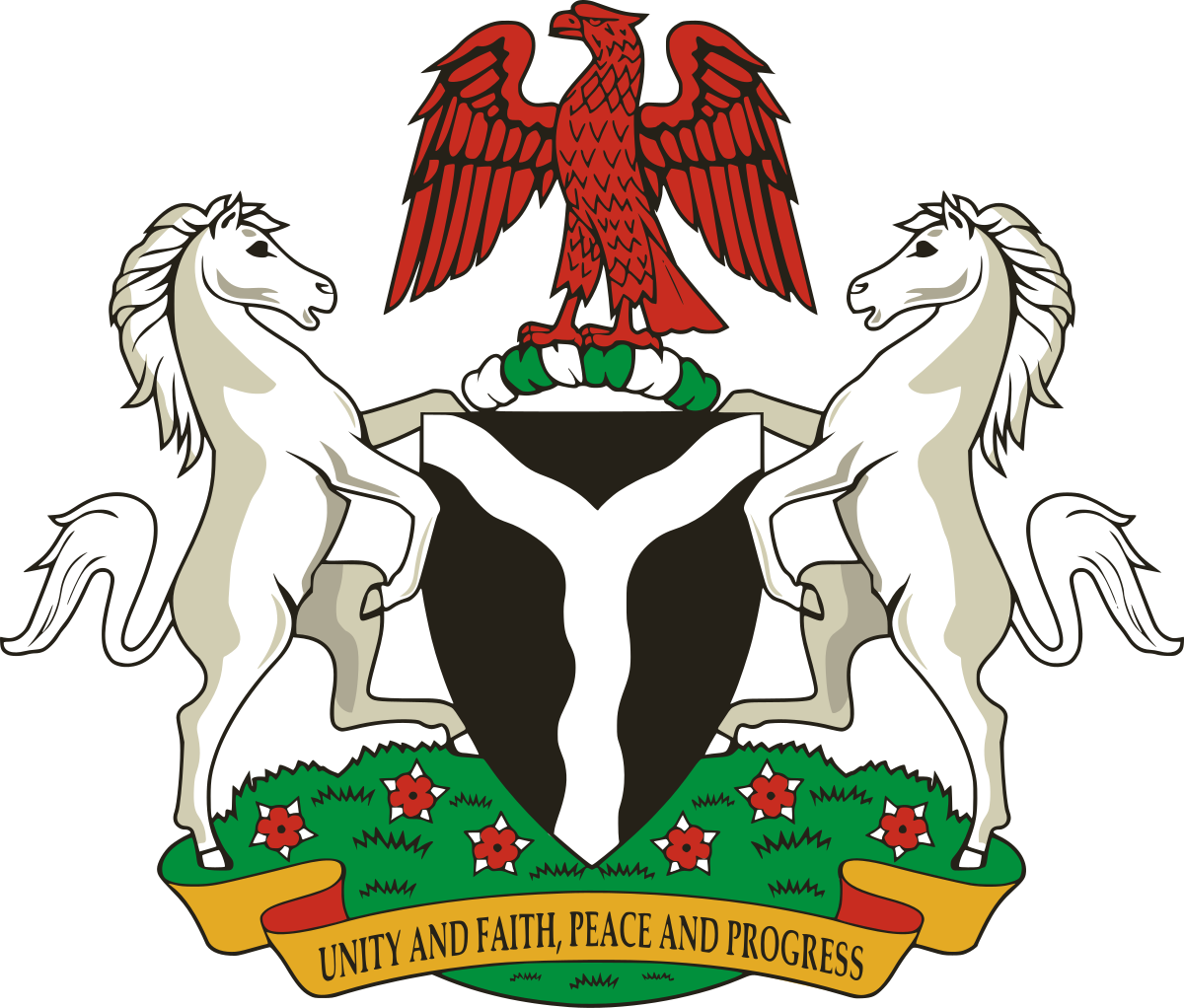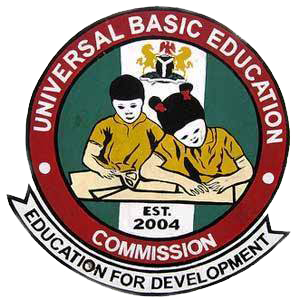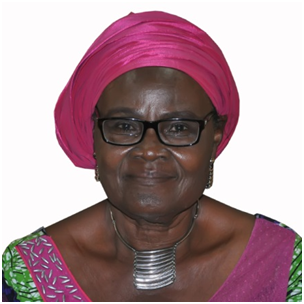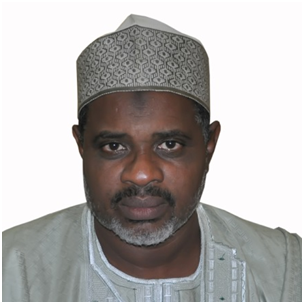DEPARTMENT OF PHYSICAL PLANNING
Engr. Sadiq Abubakar Sa‟ad was born in Lagos on 27th July, 1966. He started his primary school education in Lagos but transferred to Central Primary School, Gombe, in 1971 and left in Primary Seven in 1977. He worked as a Pupil Teacher in the same school. In 1978, he gained admission into the Government Secondary School, Billiri, and came out with Division One in the West African School Certificate Examination (WASCE).
After his secondary school education, he was admitted into the School of Basic Studies of Ahmadu Bello University, Zaria, for his Advanced Level Course. After obtaining his „A‟ Levels through the IJMB Certificate, he was admitted into the Department of Civil Engineering of ABU, Zaria, in 1984 and graduated with Bachelor of Engineering (Civil) in 1989. He had his National Youth Service at the Headquarters of the Nigerian Railway Corporation in Lagos in 1990.
After the completion of his NYSC, he was employed by the defunct National Primary Education Commission as Civil Engineer II. In 1991 when the Commission was scrapped, he joined the service of Abubakar Tafawa Balewa University, Bauchi, where he worked at various times with the Physical Planning Unit and Works Department. In 1994 when the National
Primary Education Commission wasreconstituted, he rejoined the organisation.He has been with the organization till date.

Engr. Sadiq Abubakar Sa’ad
Director, Department of Physical Planning
Engr. Sa‟ad is a member of the Nigerian Society of Engineers (NSE) and a registered member of the Council for the Regulation of Engineering in Nigeria (COREN). He is also a member of Nigerian Institute of Structural Engineers and Nigerian Institute of Civil Engineers. He has vast experience in Design, Planning, Construction, Supervision and Management.
He has attended many courses both locally and internationally. He is married and has children.
His hobbies include reading, travelling, game hunting, tennis and badminton.
INTRODUCTION
The Department of Physical Planning coordinates the intervention of infrastructural development in order to ensure the delivery of qualitative basic education in the 36 States and FCT. The interventions are provided by Donor Agencies, Corporate Organizations and Federal Government using different models. This is achieved through the activities and programmes of the Department.
Most of the staff have been posted to the six (6) geo-political zones across the country to serve as resident supervisors/monitors for the various interventions and capital projects in the States.
STRUCTURE OF THE DEPARTMENT.
The Department is headed by a Director and has three (3) Units namely: Architecture, Engineering and Quantity Surveying. The Architectural Unit consists of Planners and Architects. The Engineering Unit has Civil Engineers, Building Engineers, Electrical Engineers, and Mechanical Engineers while the Quantity Surveying Unit consists of Quantity Surveyors, Land Surveyors and
Estate Surveyors. It has resident supervisors that supervise projects in the 36 States and FCT. They report to both the Director of Physical Planning and the Zonal Director of the States where they are posted as residents.
FUNCTIONS OF THE DEPARTMENT OF PHYSICAL PLANNING
The specific functions of the Department include:
- Setting up of minimum standards for Basic Education infrastructure which are subject to change periodically.
- Assessment and vetting of the infrastructural component of SUBEBs Action Plans for accessing of FGN-UBE Matching Grant and Special Education Funds.
- Participating in the Monitoring/Supervision of approved UBEC/SUBEB executed projects.
- Participating in the preparation of short, medium and long-term budgets for the Commission.
- Carrying out market surveys for basic construction materials with a view to updating cost norms and setting cost specific benchmarks for each SUBEB.
- Participating in the monitoring of Special Education Projects and Donor Agencies‟ projects when the need arises.
- Attending to major maintenance of UBEC building facilities when the need arises.
- Providing briefs on and coordinating the activities of Consultants engaged by the Commission for different projects.
- Creating and updating the records for UBEC/SUBEBs projects in terms of approved proposals and confirmed deliverables after conducting routine project and Specialized Monitoring.
- Supervision of Direct Intervention and Constituency Projects through the Residency Supervision arrangement.
ACHIEVEMENTS
The Department recorded the following achievements in the year under review:
- Assessed and vetted the infrastructural component of the Action Plans submitted by SUBEBs. This is to ensure that the specifications for the proposed infrastructural projects in the Action Plans comply with the UBE minimum standards and guidelines and are in line with best practices. This aspect of work covers both the FGN-UBE matching Grant and Special Education Funds. This is done periodically as SUBEBs send in their request for accessing FGN-UBE Intervention funds.
- Conducted specialized monitoring of approved and executed projects for Matching Grants in 36 States and FCT in December 2020.
- Through its Residency Supervision arrangement, the Department:
- supervised 147 Constituency Projects for the year 2019;
- worked closely with Consultants to supervise 93 North East special Intervention Projects; and
- supervised the construction and ensured the delivery of 257 Zonal Intervention Project‟s (ZIP)Constituency projects for 2018.
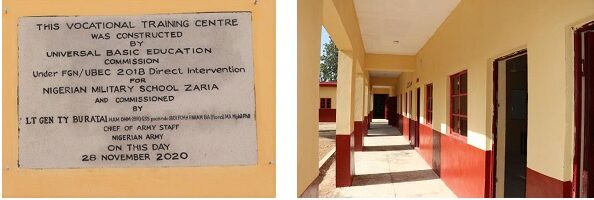

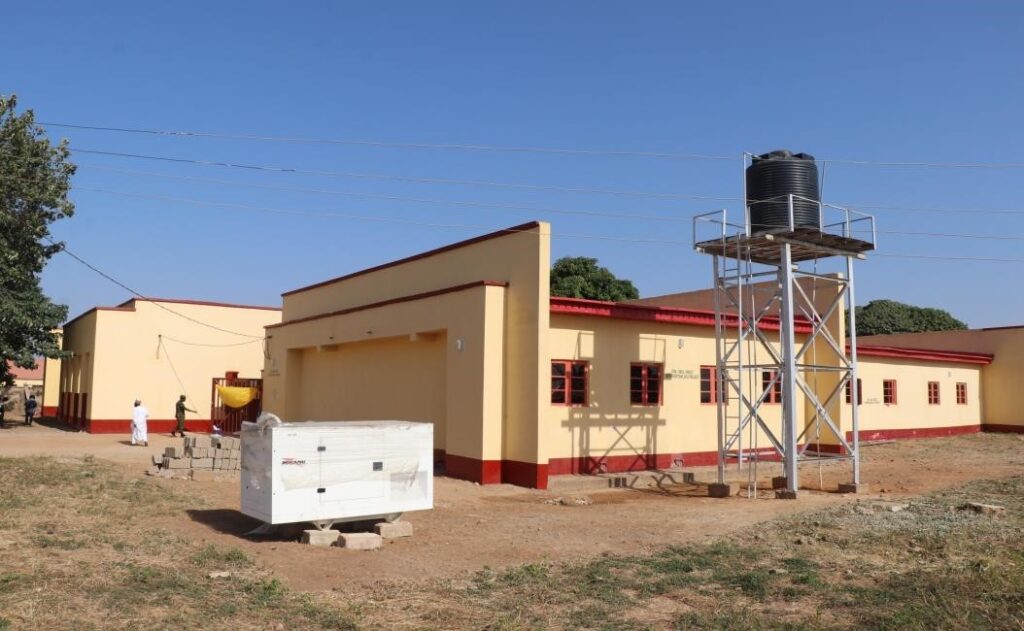
A Special Intervention Project constructed by UBEC in Nigerian Military School, Zaria
- Produced Designs and Bill of Quantities for the 2020 ZIP Constituency
- Conducted training for Physical Planning Staff on Digital project monitoring.
- Produced Designs for two (2) UBEC Zonal Offices.
CONSTRAINTS
The Department faced the following constraints in the discharge of its functions:
- Insufficient vehicles to undertake supervision and monitoring of projects.
- Inadequate number of technical Staff especially Quantity Surveyors and Structural Engineers.
- Limited working tools that would enhance the capacity of technical staff at project sites especially tools that will address the issue of quality at sites.
- Inadequate periodic training to enhance the capacity of officers and expose them to new techniques in project supervision and management.
ON-GOING ACTIVITIES
The following activities are on-going in the Department:
- Working closely with project consultants for the supervision of UBEC Model 1 and 2 Sites in 20 locations.
- Supervision of 289 Nos of Direct Intervention Projects.
- Supervision of 789 Nos of 2020 Constituency Projects.
- Supervision of the [1] ZIP constituency and Direct Intervention projects.
- Supervision of the construction of two (2) UBEC Zonal Offices at Kaduna and Ibadan.
- Working on the Design for the senatorial Model Smart School.
FUTURE ACTIVITIES
The following are the activities that the Department intends to carry out in the future:
- The Department will conduct a market survey on building materials for infrastructural development in Basic Education Institutions for 36 States and FCT.
- The Department wants to acquire working tools that would assist technical officers in the supervision of their sites.
- The Department is working closely with the States to ensure that submission and assessment of Action Plans are done electronically.
- The Department is working closely with the States to ensure that projects are monitored electronically.
- The Department will deploy IT solutions for record keeping of verifiable deliverables from FGN/UBE Matching Grant and UBEC Special Intervention Projects.
- Source ways of getting cheaper building materials in States in order to reduce the cost of provision of infrastructural facilities.
- Develop a maintenance plan for States for their infrastructural projects
CONCLUSION
Despite the constraints mentioned above, the Department, with the support of the various Departments and Management of the Commission, was able to record the above achievements and it is the hope of the department to record more achievements in the years to come.

